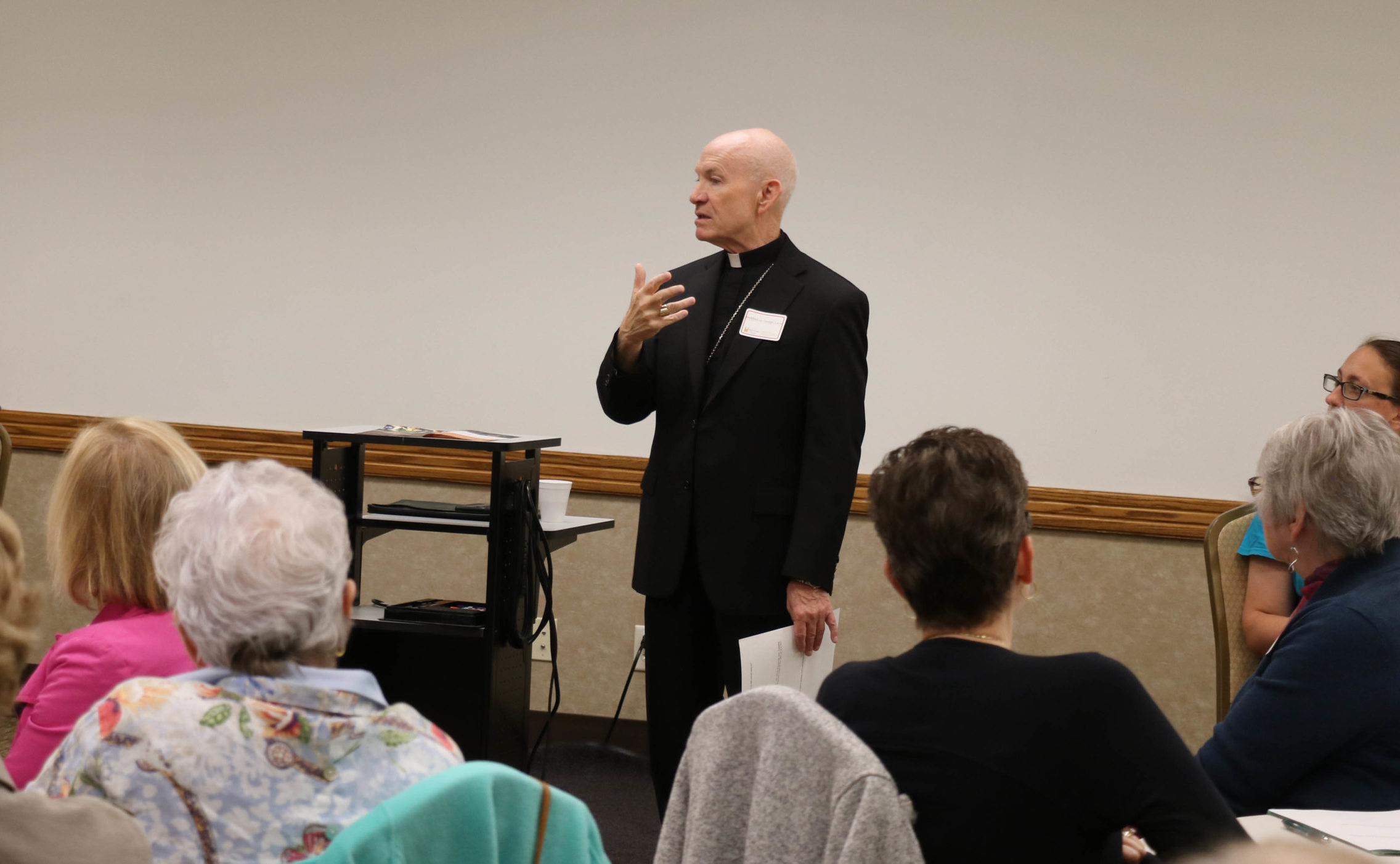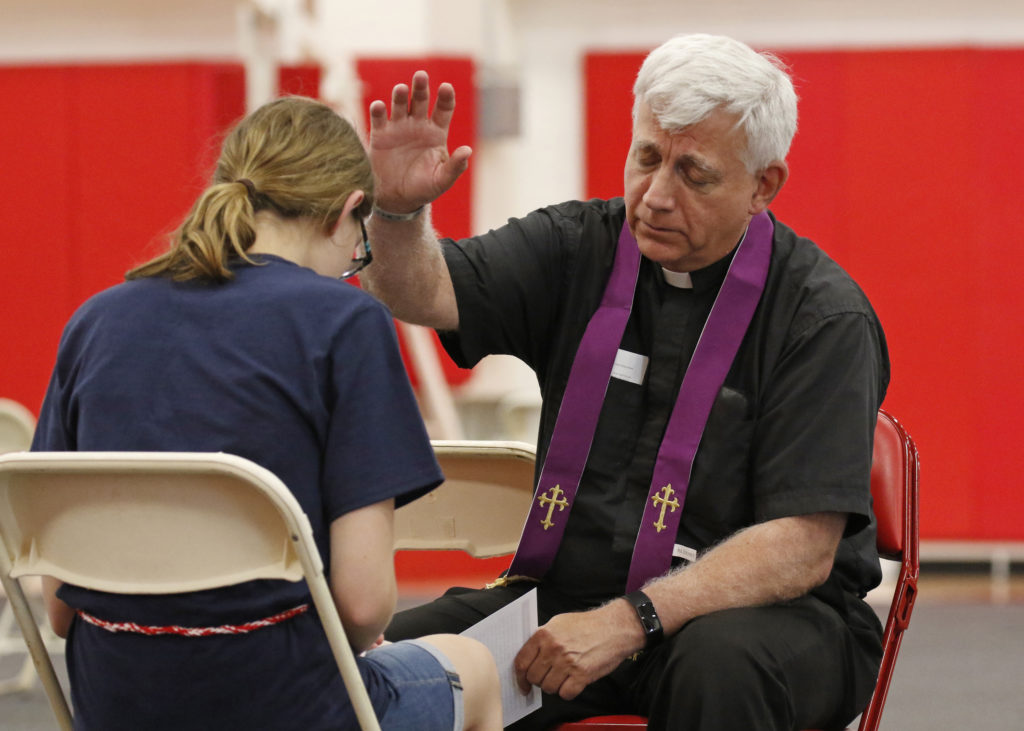
Shepherd's Voice
‘Invite Jesus to come into your life today’
February 20, 2020
Archbishop Lucas encourages us to go to confession this Lent
In this week’s interview, Archbishop George J. Lucas speaks with communication manager David Hazen about the sacrament of reconciliation in preparation for the upcoming season of Lent. The archbishop teaches that the risen Jesus is present in the sacrament in a powerful way, ready to bring the mercy of God to us right where we need it.
Q: This penitential season is a time when Catholics are often invited to receive the sacrament of penance. However, many people view going to confession as a chore, as something unpleasant. It seems that for a lot of us, it is easy to focus more on what we have to do in confession than on what we receive there.
It is easy enough for us to focus on ourselves and on our shortcomings, but the sacrament really is an encounter with the risen Jesus. The more we focus on him, the more we will be attracted to it.
We know in our Catholic faith that we encounter Jesus in a very personal way in the sacrament of the Eucharist. I propose that, especially during this Lenten season, we try to see confession as another really powerful encounter with him.
It can be kind of embarrassing to acknowledge our sins. I know at my age I’m often a bit ashamed that some of the same shortcomings I had as a younger man are still a part of my life. I am not proud of that at all. But it’s a fact.
So the church invites us to look at those things. We examine our conscience to take responsibility for our selfishness, for believing the lies of the devil and giving in to the lure of short-term pleasure.
Having recognized our sins, we don’t just sit there with them or look at our weakness in a way that would lead us to think less of ourselves. The first temptation of the devil is to get us to sin; the second temptation is to get us to think that we’re worthless on account of our sins.
The beautiful thing about the sacrament of penance is that we come to the church with an acknowledgement of our sins. It is a vulnerable moment when we bring our sins into the open. But what do we find? We find that Jesus comes to meet us there in the person of the priest. The risen Jesus is really there in a powerful way.
Why does he want to be there? He certainly doesn’t want to embarrass or punish us on account of our sins. He is there because of his saving mission to bring the mercy of God to us right where we need it.
It is not God’s desire that we die in our sins, nor that we drag the guilt of sin around with us. Jesus comes to remind us of the dignity that is ours in baptism. God wants us to receive the inheritance of members of his household, a gift that Jesus has won for us by his death and resurrection.
The sacrament of penance is designed to be a very positive and liberating experience. It is always the desire of Jesus that we experience more freedom, the freedom to really grow into the people that we have been created to be.

Father Michael Phillippino of the Diocese of Norwich, Conn., administers the sacrament of reconciliation July 20, 2019, during the Steubenville NYC youth conference at St. John’s University in Jamaica, N.Y. In this week’s Q&A, Archbishop Lucas explains that the sacrament is designed to be a very positive and liberating experience. GREGORY A. SHEMITZ, LONG ISLAND CATHOLIC/CNS PHOTO
Q: It strikes me that the sacrament of reconciliation is a concrete way of practicing dependence on God. Many of us, however, struggle with being scrupulous or worry about confessing exactly the right way.
You’re exactly right. A related question people often ask is, “Why do I have to go to confession?” or, “Why can’t I just think of my sins and tell God I’m sorry?”
We should absolutely do that every day. But the sacrament of penance falls under the general category of worship, of liturgy. That means that while it’s a very personal thing (a conversation between an individual and the confessor), the priest also represents the entire body of Jesus, the church.
Participating in this sacrament is a way to give honor and glory to God. It is really nothing other than acknowledging that God is God and that I am not.
Whenever I sin, I’m saying, in essence, that I will be god of that little portion of my life. On most days, I may let God be in charge of the big things – the moon and the stars and such. But some parts of my life, I will take over.
That is sin. That’s what hurts me and hurts others because it is not true. It is not the way I am created.
The sacrament of reconciliation is a moment when we acknowledge we’ve tried to be god of parts of our lives, and that those choices have hurt our relationship with God and others.
Explicitly worshiping God in this way also enables us to turn away from sinful choices. We walk out of the sacrament of confession facing in the right direction and having a clear sense of the basic truth that God is God and we are not.
Q: Could you offer some direction on the most important parts of making a good examination of conscience and a good confession? It seems that is a point at which people often get stuck.
Yes, it can seem daunting. There are a lot of materials available for preparing for confession, so I suggest people focus on just one and spend time praying with it.
The penitential practices that we’re encouraged to take on during the season of Lent – prayer, fasting and almsgiving – also till the soil for us, and get us out of ourselves a little bit.
The basic encouragement I would give is to invite Jesus to come into your life today, to let you see your great dignity as a daughter or son of God. Ask him to help you see where you may be holding onto selfishness or self-indulgence or willfulness.
If you have any fear or embarrassment about coming to the sacrament, invite the Lord to be with you there. It really is a huge turning point in our understanding of discipleship and the Christian life to recognize that Jesus wants to be with us precisely where we don’t necessarily want him to be.
We resist letting anyone see some of these parts of our lives. We often don’t want to admit we are weak or sinful. The Lord is not afraid of any of that and he’s not embarrassed by us.
So in prayer, we should invite him to help us make a good and sincere confession. A good confession is one that is not just complete in all the details, but is a real act of worship; in it we acknowledge God as our loving Father, Jesus as our Savior, and resolve to let go of whatever it is that is keeping us from experiencing him more powerfully.
And then I think the Lord will comfort us. He will communicate to us his strength and his desire to be close to us. My hope is that even though we may walk into the confessional with a bit of discomfort (which we have of course brought on ourselves), we will also have confidence and hope that the sacrament will be a great moment – one which will point us in the right direction going forward.